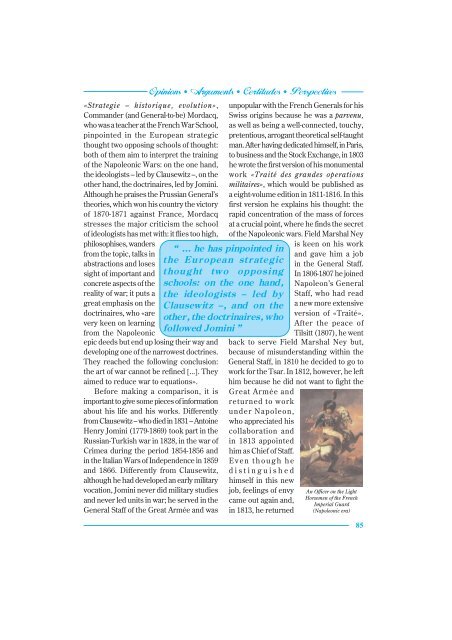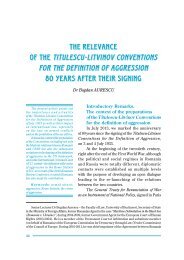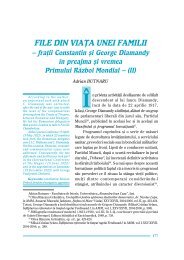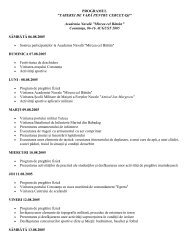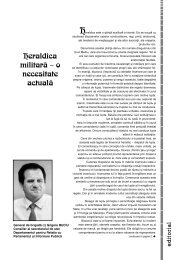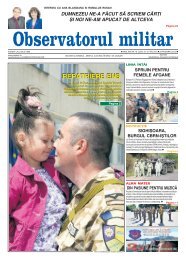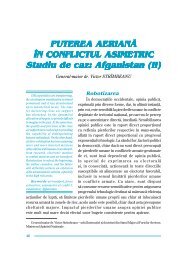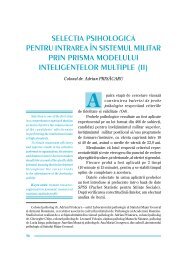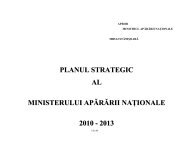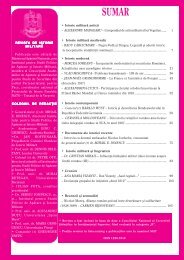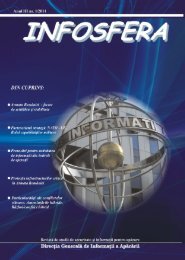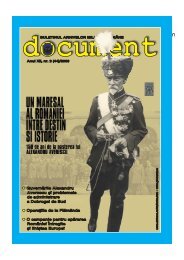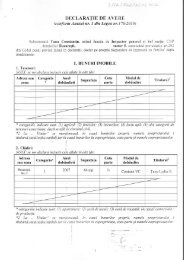Romanian Military Thinking
Romanian Military Thinking
Romanian Military Thinking
Create successful ePaper yourself
Turn your PDF publications into a flip-book with our unique Google optimized e-Paper software.
Opinions • Arguments • Certitudes • Perspectives<br />
«Strategie – historique, evolution»,<br />
Commander (and General-to-be) Mordacq,<br />
who was a teacher at the French War School,<br />
pinpointed in the European strategic<br />
thought two opposing schools of thought:<br />
both of them aim to interpret the training<br />
of the Napoleonic Wars: on the one hand,<br />
the ideologists – led by Clausewitz –, on the<br />
other hand, the doctrinaires, led by Jomini.<br />
Although he praises the Prussian General’s<br />
theories, which won his country the victory<br />
of 1870-1871 against France, Mordacq<br />
stresses the major criticism the school<br />
of ideologists has met with: it flies too high,<br />
philosophises, wanders<br />
from the topic, talks in<br />
abstractions and loses<br />
sight of important and<br />
concrete aspects of the<br />
reality of war; it puts a<br />
great emphasis on the<br />
doctrinaires, who «are<br />
very keen on learning<br />
from the Napoleonic<br />
epic deeds but end up losing their way and<br />
developing one of the narrowest doctrines.<br />
They reached the following conclusion:<br />
the art of war cannot be refined [...]. They<br />
aimed to reduce war to equations».<br />
Before making a comparison, it is<br />
important to give some pieces of information<br />
about his life and his works. Differently<br />
from Clausewitz – who died in 1831 – Antoine<br />
Henry Jomini (1779-1869) took part in the<br />
Russian-Turkish war in 1828, in the war of<br />
Crimea during the period 1854-1856 and<br />
in the Italian Wars of Independence in 1859<br />
and 1866. Differently from Clausewitz,<br />
although he had developed an early military<br />
vocation, Jomini never did military studies<br />
and never led units in war; he served in the<br />
General Staff of the Great Armée and was<br />
“ ... he has pinpointed in<br />
the European strategic<br />
thought two opposing<br />
schools: on the one hand,<br />
the ideologists – led by<br />
Clausewitz –, and on the<br />
other, the doctrinaires, who<br />
followed Jomini ”<br />
unpopular with the French Generals for his<br />
Swiss origins because he was a parvenu,<br />
as well as being a well-connected, touchy,<br />
pretentious, arrogant theoretical self-taught<br />
man. After having dedicated himself, in Paris,<br />
to business and the Stock Exchange, in 1803<br />
he wrote the first version of his monumental<br />
work «Traité des grandes operations<br />
militaires», which would be published as<br />
a eight-volume edition in 1811-1816. In this<br />
first version he explains his thought: the<br />
rapid concentration of the mass of forces<br />
at a crucial point, where he finds the secret<br />
of the Napoleonic wars. Field Marshal Ney<br />
is keen on his work<br />
and gave him a job<br />
in the General Staff.<br />
In 1806-1807 he joined<br />
Napoleon’s General<br />
Staff, who had read<br />
a new more extensive<br />
version of «Traité».<br />
After the peace of<br />
Tilsitt (1807), he went<br />
back to serve Field Marshal Ney but,<br />
because of misunderstanding within the<br />
General Staff, in 1810 he decided to go to<br />
work for the Tsar. In 1812, however, he left<br />
him because he did not want to fight the<br />
Great Armée and<br />
returned to work<br />
under Napoleon,<br />
who appreciated his<br />
collaboration and<br />
in 1813 appointed<br />
him as Chief of Staff.<br />
Even though he<br />
distinguished<br />
himself in this new<br />
job, feelings of envy<br />
came out again and,<br />
in 1813, he returned<br />
An Officer on the Light<br />
Horsemen of the French<br />
Imperial Guard<br />
(Napoleonic era)<br />
85


